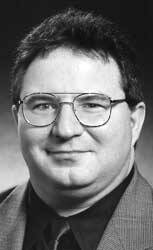Last winter, I drove alone in the early dark through some of Philadelphia’s poorest, most blighted and most crime-torn neighborhoods. I was headed downtown to do some Christmas shopping, and as I drove I caught a glimpse of a group of African-American children, none dressed adequately for the damp and cold night weather, playing in a garbage-strewn lot behind a line of boarded-up row houses.
Just as I made my way past them and was turning onto the big boulevard, I heard “Merry Christmas!” The turn complete, I caught a sideways glimpse of a makeshift chorus waving to me across six lanes. “Merry Christmas!” they all shouted again, jumping as they called out.
The next moment, the silly Christmas oldie playing on the car radio suddenly went silent. Using the radio controls in the steering wheel of my luxury sport utility vehicle, I switched channels. Nothing happened; and there was no sign of the “no signal” light on the monitor. The dashboard lights seemed unusually bright. But still there was no sound. Then I noticed there was no stream of traffic going my way, not even a single car.
Weird, I thought. My mind went blank, and then the radio, which I distinctly thought I had turned off, came back on. Weirder still, I could swear that the second before it resumed I had started silently singing the very song that was now playing.
The middle chorus of John Lennon’s “So this is Christmas” rang out, wishing for a happy New Year “without any fear.” I was never a really big Lennon fan, but I had always liked this song, even though it lifted and sank my spirits at the same time.
My mind raced my heart back to the image of the Christmas gift I had just received without deserving it. I grew up in what has since become a neighborhood as poor, blighted and crime-torn as the one my drive-by Christmas well-wishers call home. But I am not a typical well-off white suburbanite, right? And, in some years, I’d embroider my secret pride over still shopping downtown by stopping on the way at one of the inner-city, minority-led ministries I have helped to support in one way or another.
But then I realized that I had not done even that since my children, now all adults and on their own, were no older than the little ones I had just stolen a “Merry Christmas” from. I suddenly felt deeply stupid about my “I shop in the city for Christmas” conceit. And now I was being lectured harshly by Lennon, who was asking me melodically but pointedly whether I had truly done anything since last Christmas to ensure that the most needy children among whom I live are loved, cared for and happy “without any fear.”
I kept driving. Maybe as a psychological (or was it spiritual?) defense mechanism, the social scientist part of my brain started to feed into my consciousness a stream of statistics that I had recently written into the outline of a research paper: America is home to more than 11 million African-American children. The poverty rate among African-American children is about 35 percent. Rates of every socioeconomic ill from chronic hunger to violent-crime victimization remain extreme among low-income African-American children; and that is not all the bad news.
The grim statistics rattling in my head only made me feel more convicted. Earlier that very day I had lectured about how key government anti-poverty programs for “at risk” children had fallen apart in recent years; how the promise of expanded children’s health insurance coverage had been hollowed first by inadequate funding and next by inadequate administration; and so on. But the lecture did not stress the reason for those failures that now engulfed me: not enough people had truly cared enough, me included.
With the image of those children waving and jumping now impossibly thick before me, I was almost in a trance when I made a jug-handle turn and pushed the speed limit back the other way as Lennon repeated his homily calling me to account.
As I drove past the site where Christ had the holy children appear and call to me, I resolved to make 2011 a year for renewed dedication to them. I have driven past the same lot dozens of times in the past year, but I have yet to fully honor that resolution. I pray that I do, and that we all do, before next Christmas.









Peace,
Tim